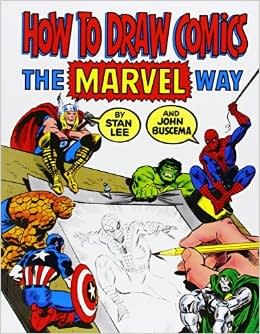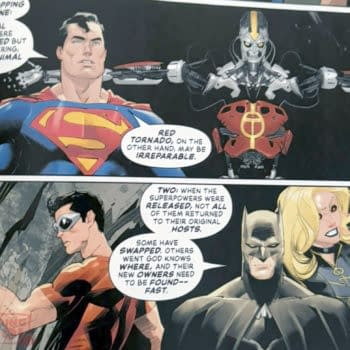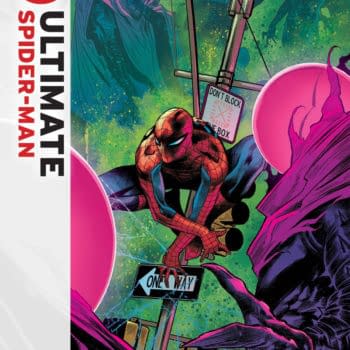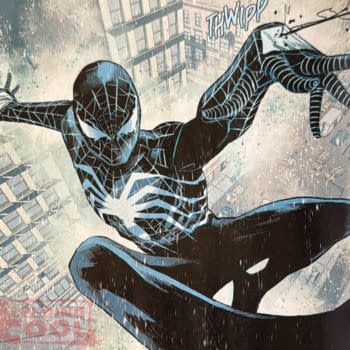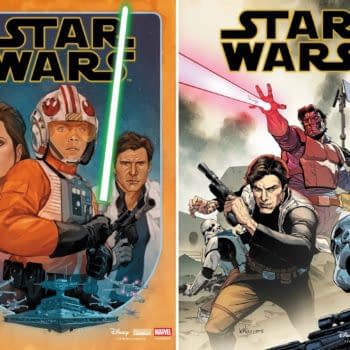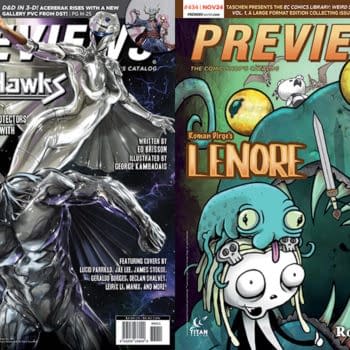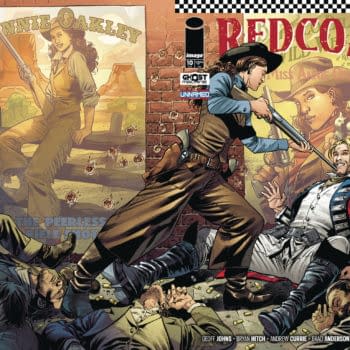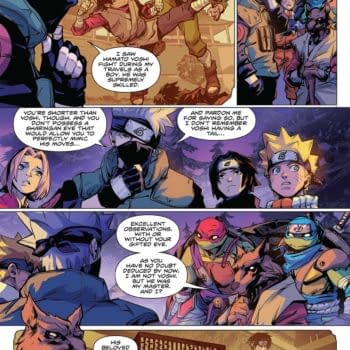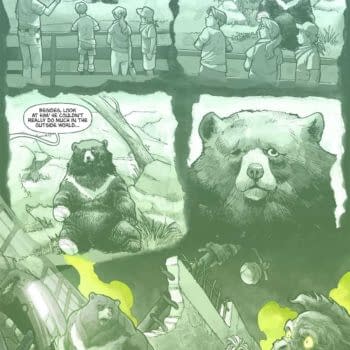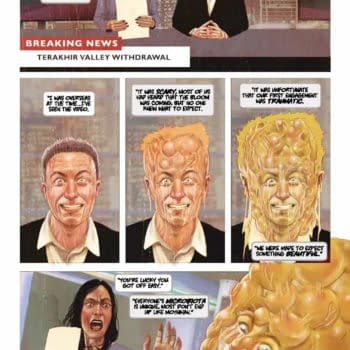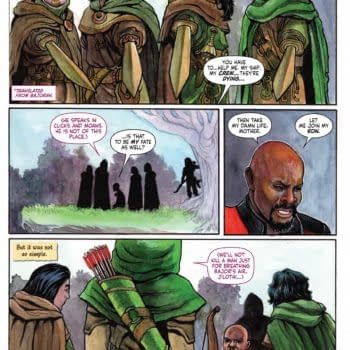Posted in: Comics | Tagged: Comics, entertainment, marvel, NYCC
Breaking Into Comics… The Marvel Way! At NYCC '15
One thing I love about NYCC—and Comic Cons for that matter—is the amount of educational/informative panels that offer advice and help get the head together in terms of doing what you love. In this case it was breaking into the comics industry. Moderating the panel we had Marvel's Talent scout Rickey Purdin, who was joined by: Robbi Rodriguez (Spider Gwen), Mark Brooks (Uncanny X-Force), Kris Anka (Wolverines), and CB Cebulski (Marvel Talent Scout).
This panel was so great and full of useful advice for beginners who want to set their feet into the comic book industry. After introductions Purdin asked each panelist how they first broke into comics. Rodriguez answered it was through Kickman, which he called a boot-leg comic book. Brooks said he first broke into comics by working in some minor regional comic book for free and he started escalating up from there—a 4-year gradual process. Anka stated he first started by working as a designer for Sideshow Collectibles until he finished school. Cebulski, on the other hand, stated he wanted to be a writer , yet he was always denied. After that he tried going for the editorial side—after going to Japan and working for a few years, he then came into Marvel for translations and from there it took off.
Cebulski stated there is no such thing as overexposure when one is trying to break into the industry—that as creators one should not limit themselves to just one social media platform. It is good to have different social media outlets because one does not know where and how they will come across to an opportunity. Through each platform one can possibly come across with another person—be it artist, writer, editor—who actually is looking for someone to work with. He encouraged creators in the room to put their stuff out there. Purdin suggested that, if you post other stuff, to differentiate what is your work from the rest: create tags that might help others get to your work and recognize it.
A member of the audience asked the panelists about exposure for writers and how to get noticed online or through social media. Purdin quickly answered: write something that can get drawn, since editorial does not always have the time to read scripts. Cebulski added that, while it is good to have a script, it is always better to have something at hand that you can give away and already printed in comic book format—he said it will show how you handle narration and how you handle dialogue. He encouraged creators to print, do some research on editors, and sent to an editor who specializes in the genre you write in. He also added to know the editor you are sending it to, tailor your submission package and cover letter for them.
Another person asked about submitting blog-posts, she was curious to find out how those help during the submission process. Cebulski answered that stories about yourself, your life, your family are still stories; and it all depends on how you put the words together and sell it. Editors can read it and see through it how impactful they can be.
The next question was regarding branching out to different mediums: going from comic books to novels, to video game development—he wanted to know if it is a waste of time. Purdin answered it is not at all. Brooks then added that it is always good to know where your strengths lie; but they encouraged everyone to try what makes them happy.
Regarding submissions and copyrights, Cebulski suggested creating your own stuff—they like to see how people handle their own creations and characters before tackling existing properties. When asked about the script formats for submissions or if there is a particular format that should be followed, Cebulski answer that there is not really. He said that the most common styles are screenplay style and paragraph style, which at Marvel they call the Stan Lee Style; they both offer directions and descriptions of shots to help the artist. He suggested we look at scripts as letters to the artist, to the editor, and to the fans.
The next question was regarding Marvel and what they look for in people applying for editorial staff and interns. Cebulski quickly answered they look for people who have deep love for comics and good stories, hopefully with a background on creative writing or working with books; also someone who is good at expressing stuff in an articulate manner. Brooks added that enthusiasm is big part of it since being an editor is pretty much like being a cheerleader, also being good at multitasking is always a plus.
Someone then asked for pointers or ideas for transitioning styles, since their style is more manga oriented than comic book oriented. Cebulski answered that a lot has changed throughout the years in the comic book style—he advised to not change style, more so look for something that comes naturally to you and incorporate all the influences into your own style. Brooks added that if you like it, just try working on it and getting better at it. Rodriguez said it is a lot like Hip Hop, it is about making your own style.
Cebulski also had some suggestions: do not go crazy with story-telling, stick to the grid, do not over sexualize, make your characters look human and treat them as such, remember the distinguishing factors of a character. For those looking for resources he was very helpful, he suggested connecting to those present in the room, talking to people in Artist Alley, going to websites like: PencilJack.com, DigitalWebbing.com which are forums specifically for writers/artists/creators one can network through. He also suggested Mark Millar's MillarWorld.com for online resources, since he is always promoting places looking for creators as well. Brooks then suggested DeviantArt.com and paying the artists you work with—he added it does not have to be much, if you are starting it can be from $0-$10 a page and the artist will really appreciate it and do their best.
Before closing one of the things that was stressed was: put your work out there and self advertising, pushing your own work. Rodriguez suggested learning how to sell your own work, to which Cebulski added "you're your own best salesman." Brooks also added that starting an online brand is very helpful.
Ale Bodden is a freelance artist and writer. It is her third year attending NYCC with Bleeding Cool. You can follow her art-ventures through twitter at: @Nerdy_Faery, or through IG: @NerdyFaery.


